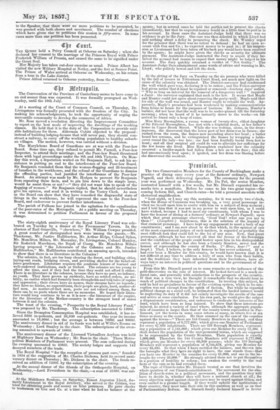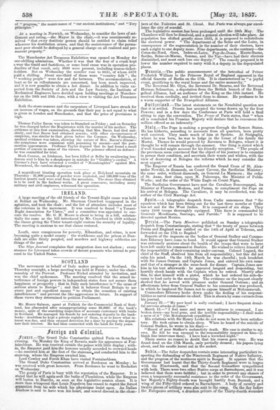Vrodurint.
The two Conservative Members for the County of Buckingham make a practice of dining onco every year at the farmers' ordinary, Newport l?agnell, and there delivering speeches. The ceremony for the present year was performed on Wednesday. Mr. Du Pr6, the senior Member, contented himself with a few words, but Mr. Disraeli expanded his re marks into a manifesto. Before he came to his two great topicsâthe coming Reform Bill, and Church-ratesâhe told a personal anecdote with rhetorical amplification.
"Last night, or I may say this morning, for it was nearly two o'clock, when the House of Commons was breaking up, a very great personage in
vited me to call upon him to confer with him on a subject of deep moment and I told him that it was not in my power to wait upon him, as I could have wished, because I had to meet my constituents, with whom I was to
have the honour of dining at a fanners' ordinary, at Newport Pagnell; upon which that great personage observed, 'Good God ! what can you say to them ?' (Laughter.) Gentlemen, this is the solution of the inquiry of that eminent personage. I have kept may engagement to meet a body of my constituents; and I am now about to do that which, in the opinion of one
of the most experienced judges of such matters, is regarded as probably the most difficult task that could fall to the lot of any man. Now, that great personage, although he hits received all that the favour of the Sovereign
and the confidence of the people could bestow upon hint in his distinguished career, and although he has also been a County Member, never had the honour of representing the county of Bucks. (" Hear, hear ! " and is
laugh.) That, I believe, is the only honour he has never achieved. If ho
had ever been a Member for this county, he would have known that it is not difficult at any time to address a body of men who from their habits, and the traditions they have inherited from their forefathers, have always taken an interest in political questions and in the government of the country." From this Mr. Disraeli passed on to some remarks on the influence of the gold-discoveries on the rate of interest. Ile looked forward to u much re duced rate, and generally with satisfaction to the prospects of the country. If that was a true view, he thought it remarkable that we should hear 50 much of political changes in the constitution. In treating this subject, he said he had no prejudices in favour of the existing system, which in its con ception was not exempt from the spirit of faction. But while he regarded political change as a social evil, he intimated that the landed interest would be neglecting its duty if it did not calmly investigate the merits of the case
and arrive at some conclusion. For his own part, he would give the subject a dispassionate consideration, and endeavour to vindicate the interests of the land, which have been so long injured. To show that these interests are
injured, he stated a variety of eases where, although the aggregate population of counties is larger than that of the county towns represented in Par liament, yet the towns in sonic cases return as many, in others five or six times as many as the county. He thus summed up the case of the counties against the townsâ" There are 144 County Members in England, and they represent a population of 9,777,000; which gives one Member of Parliament for every 67,883 inhabitants. There are 319 Borough Members, representing a population of 7,144,000 ; which gives one Member for every 22,384. I shall deduct the population of the unrepresented towns, which are supposed to be represented by the County Members. Their population is exactly 1,000,000. Therefore the 144 County Members will represent 8,777,006, which gives one Member for every 60,869 persons; while the 319 Borough Members will represent a population of 8,144,678, giving one Member for every 26,636. So that when I have rectified the balance, and thrown into the boroughs what they have no right to have, the case stands thusâthat you have one Member in the counties for every 61,000, and one in the boroughs for every 25,000." lie strongly advised them not to put themselves in a position of hostility to reform ; but awaken the country to the real facts of the case as he had revealed them. The topic of Church-rates Mr. Disraeli treated as one that involves the whole question of our Church-establishment. The movement for the abo lition of church-rates is a political movement, and the question they will have to decide is, whether they will have a national church at all ; for every objection urged against church-rates may be urged against tithes, and even carried to a greater length. If they would uphold the institutions of their country, they must take their side on this question as well as on that of Parliamentary Reform. Mr. Disraeli finally declared himself in favour
of "progress," the maintenance of "our ancient institutions," and "Tory principles."
At a meeting in Norwich, on Wednesday, to consider the laws of settlement and rating,âthe Mayor in the chair,âit was unanimously resolved "that every destitute person should be entitled to claim relief wherever his destitution arises, and that the maintenance of the permanent poor should be defrayed by a general charge on all realized and permanent property."
The Manchester Art Treasures Exhibition was opened on Monday for one-shilling admissions. Whether it was that the fear of a crush kept away the timid and fastidious, or some local cause was in operation productive of that result, only 3000 were present, including season-ticketholders. But on Wednesday the number rose to 6631, of whom 5370 p aid a shilling. About one-third of these were "country folk " ; the "working people" were few and far between. The accommodation, at least so far as refreshments are concerned, has been much improved, and it is now possible to obtain a hot dinner. In addition to visits expected from the Society of Arts and the Law Society, the Institute of Mechanical Engineers have decided upon holding meetings at Manchester on the 24th and 25th June, with a view to visiting the Art Treasures Fxhibition.
Both the stone-masons and the carpenters of Liverpool have struck for ,nn increase of wages, on the grounds that their pay is not equal to what is given in London and Manchester, and that the price of provisions is high.
Thomas Fuller Bacon was taken to Stamford on Friday ; and on Saturday he was charged before the Magistrates with the murder of his mother. The evidence at this first examination, showing that Mrs. Bacon had died andclenly, and that Bacon had obtained arsenic, with other circumstances of suspicion, was similar to that given before the Coroner. On Wednesday, medical evidence was taken, showing the nature of Mrs. Bacon's illnessâ the symptoms were consistent with poisoning by arsenicâand the postmortem appearances. Professor Taylor deposed that he had found a small portion of arsenic in some of the viscera. The prisoner offered no defence : he was committed for trial.
Mark Connor, an Irishman, has been killed at Selby by swallowing laudanum sent to him by a shopkeeper in mistake for "Godfrey:s cordial." A Coroner's Jury have returned a verdict of "Manslaughter" against Mrs. Broomhead, the careless shopkeeper.
A magnificent blasting operation took place at Holyhead mountain on Thursday : 21,000 pounds of powder were exploded, and 160,000 tons of the hardest quartz rock were rent from the mountain. The stone thus obtained is to be used in the harbour works. A great concourse, including many military and civil engineers, witnessed the operation.



























 Previous page
Previous page